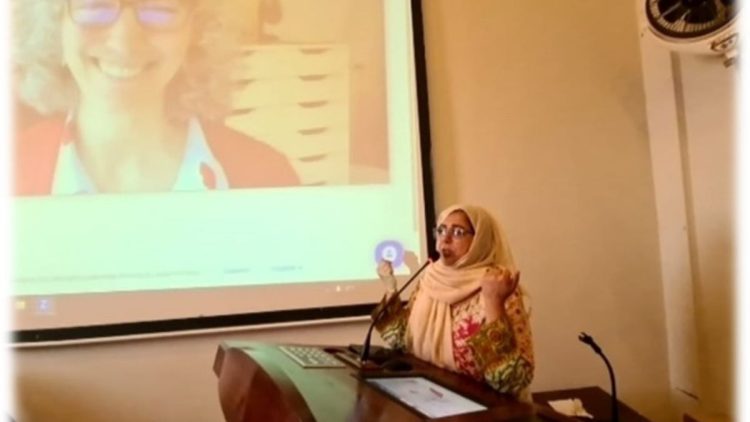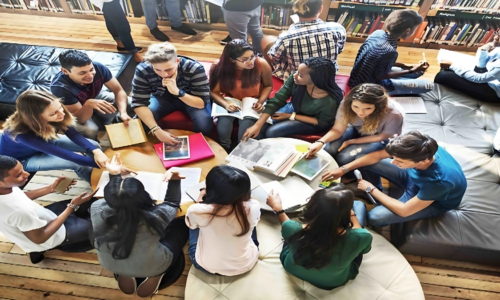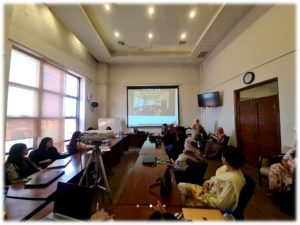
On May 25, 2023, CIPS organized a workshop under the umbrella of the Peace and Conflict program, particularly specific to the Core Course ‘Conflict and Conflict Resolution’. This workshop was organised by Dr. Humaira who invited Dr. Macarena to speak on Mediation and carry out a simulation as part of the workshop. Dr. Macarena is a UK based mediator and has worked professionally in mediation and conflict resolution since 2005. She is a qualified trainer in Mediation and Conflict Resolution. Furthermore, she has worked as a lecturer at Birkbeck College, University of London on conflict theory and reflective practice for conflict practitioners at the PgCert and MSc courses. The Mediation workshop was in hybrid mode.
Dr. Macarena spoke on topic, “Interpersonal Mediation: Working with Emotions.” She began by introducing the students with the basics like what mediation really is and what principles need to be focused on. She talked briefly about some of the principles like confidentiality, neutrality, self -determination and Voluntariness and how they are important in the process of mediation. Furthermore, she highlighted the role of mediator as an impartial and neutral third-party facilitator. She stressed upon the process and the steps that needs to be taken during the process of mediation.
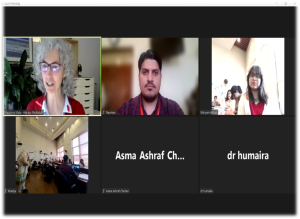
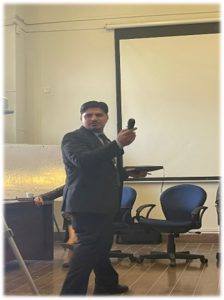
She is an expert in family mediation so she explained the importance of emotions and how a mediator should address them during family mediation. She explained the structure and functioning of brain by focusing on the anatomy of anxiety. Since emotions are connected with Human Beings at every level, she said that it was important to manage our emotions as mediator because if not properly managed then the process of mediation is compromised, and emotions take advantage of us. So, small trick is to separate the parties from the conflict focus on the interest and needs rather than their positions. Dr. Macarena emphasised upon core mediation skills like building trust, active listening, summarising, paraphrasing, managing emotions, reframing, questioning etc. These core skills according to her are the weapons which mediators should have at their disposal at all costs. So, in order to be a good mediator, one should know how to work with emotions. She also explained that family mediation is different from corporate mediation and may require different set of skills.

Students of PCS Fall 2022 performed a simulation in which they were divided into different teams. The simulation was a practical exercise on how conflict can be mediated between parties in conflict. The students were divided into teams and were tasked to develop scenario, conduct conflict analysis and prepare intervention model.
This intervention model was then later on applied by students in their simulation. The simulation had different parties who were in conflict and the students had to act accordingly. As for the mediating role three students were tasked to perform mediation between parties. One was the main mediator and the other two were co mediators. The simulation was a success and students managed to clear a lot of concepts related to mediation and conflict resolution. The PCS students engaged in a highly interactive session with Dr. Macarena, each student actively participated by asking insightful questions related to the topic. Dr. Macarena provided valuable feedback in response to each question, further enhancing the learning experience. These workshops need to be conducted in future courses as well since they help the students to interact with the experts in the field which further polishes their skills.
The author is a Peace Fellow as well as international mediation Campus (IMC) fellow. Currently he is doing his Masters in Peace and Conflict Studies from CIPS, NUST. He can be reached at naumangul27@gmail.com.

![]()

